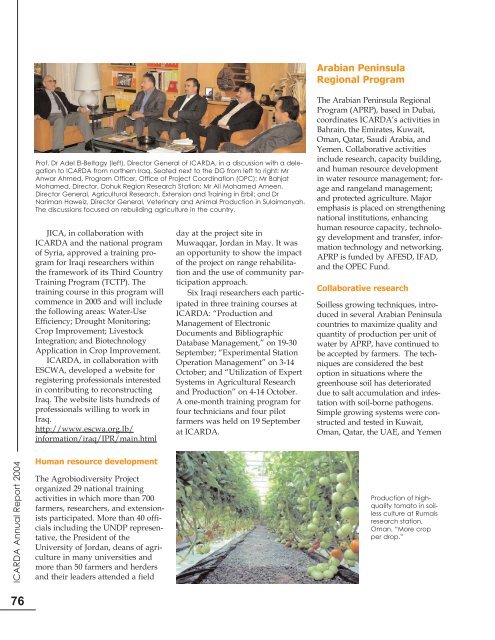ICARDA annual report 2004
ICARDA annual report 2004
ICARDA annual report 2004
You also want an ePaper? Increase the reach of your titles
YUMPU automatically turns print PDFs into web optimized ePapers that Google loves.
<strong>ICARDA</strong> Annual Report <strong>2004</strong><br />
76<br />
Prof. Dr Adel El-Beltagy (left), Director General of <strong>ICARDA</strong>, in a discussion with a delegation<br />
to <strong>ICARDA</strong> from northern Iraq. Seated next to the DG from left to right: Mr<br />
Anwar Ahmed, Program Officer, Office of Project Coordination (OPC); Mr Bahjat<br />
Mohamed, Director, Dohuk Region Research Station; Mr Ali Mohamed Ameen,<br />
Director General, Agricultural Research, Extension and Training in Erbil; and Dr<br />
Nariman Haweiz, Director General, Veterinary and Animal Production in Sulaimanyah.<br />
The discussions focused on rebuilding agriculture in the country.<br />
JICA, in collaboration with<br />
<strong>ICARDA</strong> and the national program<br />
of Syria, approved a training program<br />
for Iraqi researchers within<br />
the framework of its Third Country<br />
Training Program (TCTP). The<br />
training course in this program will<br />
commence in 2005 and will include<br />
the following areas: Water-Use<br />
Efficiency; Drought Monitoring;<br />
Crop Improvement; Livestock<br />
Integration; and Biotechnology<br />
Application in Crop Improvement.<br />
<strong>ICARDA</strong>, in collaboration with<br />
ESCWA, developed a website for<br />
registering professionals interested<br />
in contributing to reconstructing<br />
Iraq. The website lists hundreds of<br />
professionals willing to work in<br />
Iraq.<br />
http://www.escwa.org.lb/<br />
information/iraq/IPR/main.html<br />
Human resource development<br />
The Agrobiodiversity Project<br />
organized 29 national training<br />
activities in which more than 700<br />
farmers, researchers, and extensionists<br />
participated. More than 40 officials<br />
including the UNDP representative,<br />
the President of the<br />
University of Jordan, deans of agriculture<br />
in many universities and<br />
more than 50 farmers and herders<br />
and their leaders attended a field<br />
day at the project site in<br />
Muwaqqar, Jordan in May. It was<br />
an opportunity to show the impact<br />
of the project on range rehabilitation<br />
and the use of community participation<br />
approach.<br />
Six Iraqi researchers each participated<br />
in three training courses at<br />
<strong>ICARDA</strong>: “Production and<br />
Management of Electronic<br />
Documents and Bibliographic<br />
Database Management,” on 19-30<br />
September; “Experimental Station<br />
Operation Management” on 3-14<br />
October; and “Utilization of Expert<br />
Systems in Agricultural Research<br />
and Production” on 4-14 October.<br />
A one-month training program for<br />
four technicians and four pilot<br />
farmers was held on 19 September<br />
at <strong>ICARDA</strong>.<br />
Arabian Peninsula<br />
Regional Program<br />
The Arabian Peninsula Regional<br />
Program (APRP), based in Dubai,<br />
coordinates <strong>ICARDA</strong>’s activities in<br />
Bahrain, the Emirates, Kuwait,<br />
Oman, Qatar, Saudi Arabia, and<br />
Yemen. Collaborative activities<br />
include research, capacity building,<br />
and human resource development<br />
in water resource management; forage<br />
and rangeland management;<br />
and protected agriculture. Major<br />
emphasis is placed on strengthening<br />
national institutions, enhancing<br />
human resource capacity, technology<br />
development and transfer, information<br />
technology and networking.<br />
APRP is funded by AFESD, IFAD,<br />
and the OPEC Fund.<br />
Collaborative research<br />
Soilless growing techniques, introduced<br />
in several Arabian Peninsula<br />
countries to maximize quality and<br />
quantity of production per unit of<br />
water by APRP, have continued to<br />
be accepted by farmers. The techniques<br />
are considered the best<br />
option in situations where the<br />
greenhouse soil has deteriorated<br />
due to salt accumulation and infestation<br />
with soil-borne pathogens.<br />
Simple growing systems were constructed<br />
and tested in Kuwait,<br />
Oman, Qatar, the UAE, and Yemen<br />
Production of highquality<br />
tomato in soilless<br />
culture at Rumais<br />
research station,<br />
Oman. “More crop<br />
per drop.”



